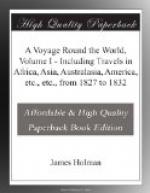70 head of oxen. 60 sheep. (principally from Africa.) 600 goats. 8 horses. 4 mules. 27 asses.
There are likewise the dogs lately imported, and a few rabbits from the Cape of Good Hope, which have been turned loose in the valleys to breed; it is feared, however, that the cats will destroy the young rabbits, if they do not the old ones. Two red-legged partridges have also been brought from the Cape, and there are a few pigeons, likewise the English linnet in a wild state.
Friday, 27.—Fine morning with a few refreshing showers. Thermometer at 6 A.M. 70 deg. F. Soon after breakfast we left the Colonel’s house to return to Regent’s Square, but we walked nearly a mile before we mounted our horses. The officers of the Establishment invited all Captain Owen’s party, and their Colonel, to dine with them to-day at their mess, which consists of Lieutenants Evans and Barns, R.M. Mr. Mitchell, Surgeon, and Mr. Trescot, Agent-victualler to the African squadron.
[Illustration: THE ISLAND OF ASCENSION]
The population of the island at that time was 192 souls,[48] all Europeans, except 40 liberated Africans, and they were then deficient of 10: the Government having allowed the number of 50 to assist in carrying on the required improvements and other employments, which consists of road-making, erecting buildings, gardening, conveying water, &c. &c. The officers of the Establishment, superintend the working parties, however, these only work four days in the week, Wednesday and Saturday being allowed them for fishing,[49] cleaning their clothes, and other private purposes, while the Sunday is of course kept holy. Their working hours are from daylight until eight o’clock, when they are allowed three-quarters of an hour for breakfast; after which they return to labour till eleven, they then rest until three o’clock; from which time they work until sunset. This arrangement, which throws open to repose the hottest portion of the day, is highly to be approved of in a warm climate.
At 7 o’clock we took leave of the Colonel and his officers, to return on board the Eden. When we got under weigh, and made sail out of Ascension-roads, for Sierra Leone, steering N.N.E.
In the year 1801, when I belonged to H.M.S. Cambrian, (the Honourable Captain Legge,) on our return voyage from St. Helena, we passed so near this island, that we sent a 24-pound shot among the hills, and saw it scatter the dust around the spot where it fell, but we did not send a boat on shore, for we knew it was then uninhabited, and our Commander was not disposed to lose his time in turning turtle, while he might be more gallantly employed chasing the enemy. We merely fired as a signal to any one that might have been left on the island by accident, for on the preceding year H.M.S. Endymion took on board the crew of a brig that had been wrecked on the island: and the celebrated navigator, Dampier, was also cast




